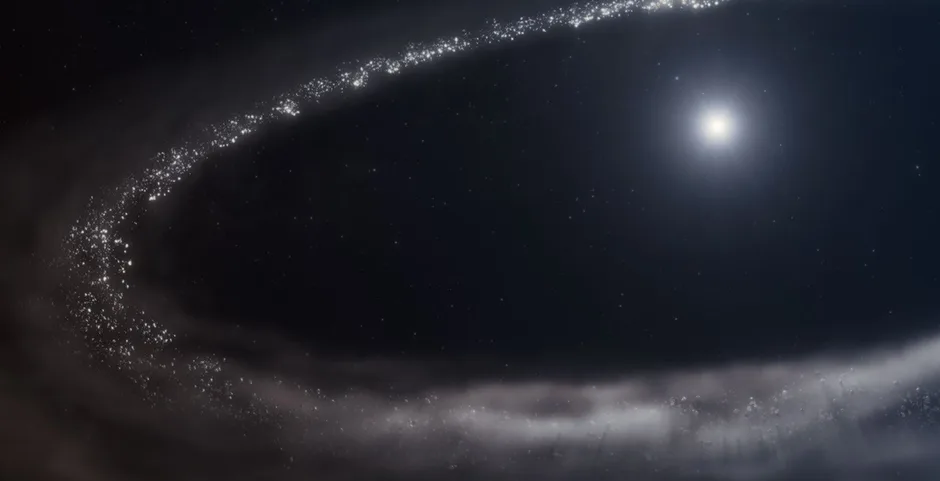Science
Webb Telescope Finds Water Ice in Nearby System, Hints at Earth-Like Worlds

NASA’s James Webb Space Telescope has discovered frozen water ice in a young star system located just 155 light-years away from Earth. This discovery could be a major step toward understanding how planets like Earth form, and where life may exist beyond our Solar System.
The star, known as HD 181327, is only 23 million years old. That makes it very young compared to our Sun, which is about 4.6 billion years old. HD 181327 is a little bigger and hotter than our Sun. It lies in a nearby part of space and has features that make it very interesting to scientists.
Using its powerful infrared sensors, the James Webb Telescope detected crystalline water ice in the system. This kind of ice is the same as what we find in Saturn’s rings and in the Kuiper Belt. The Kuiper Belt is a cold, icy zone at the edge of our Solar System where many comets and small frozen bodies live.
Water ice plays an important role in the formation of planets. It helps small pieces of dust and gas stick together to form larger objects. This is especially important in building giant planets, like Jupiter or Saturn. Water ice can also bring water to rocky planets, like Earth. That makes this discovery very exciting.
The area around HD 181327 looks a lot like our own Solar System. It has a gap close to the star that is free of dust. Further out, there is a ring of icy material. This setup is similar to what we see with our planets and the Kuiper Belt. Scientists believe this structure is common in systems where planets are forming.
Until now, scientists had only guessed that water ice could exist in such young systems. But they didn’t have the tools to prove it. That changed with the launch of the James Webb Space Telescope. Its high sensitivity allows it to detect very small amounts of ice and dust in space.
The frozen water is likely being released by collisions between icy objects in the outer part of the system. When these objects crash into each other, they throw dust and ice into space. The telescope can see this material, which gives scientists new clues about what is happening in these early stages of planet formation.
This is the first time scientists have clearly seen water ice in a system like this. It confirms that the building blocks of planets and possibly life can exist even when a star is still very young. This is a big step in understanding how solar systems form and change over time.
So far, no planets have been discovered around HD 181327. But the presence of water ice suggests that rocky planets, possibly like Earth, could form there in the future. Water is one of the most important parts of life on Earth. If a planet has water, it might also have the right conditions for life to begin.
On Earth, scientists think that some of our water came from icy comets that hit the planet in its early years. A similar process could happen in other systems. If rocky planets form around HD 181327, they might also get water this way. That means the seeds for life could be planted there too.
The James Webb Telescope will keep watching HD 181327 and other young star systems. The goal is to learn more about how planets form and how water and other useful materials move around in space. This could help answer big questions like where we came from and whether we are alone in the universe.
The telescope has already made many exciting discoveries. It has found some of the oldest galaxies in the universe, measured chemicals on distant planets, and now, confirmed the presence of water ice in a new star system. Each of these findings helps us understand more about the universe and our place in it.
This latest finding shows that even young stars can have the right materials to build planets and maybe even life. The universe still holds many secrets, but with powerful tools like the James Webb Telescope, we are slowly uncovering them, one icy discovery at a time.








